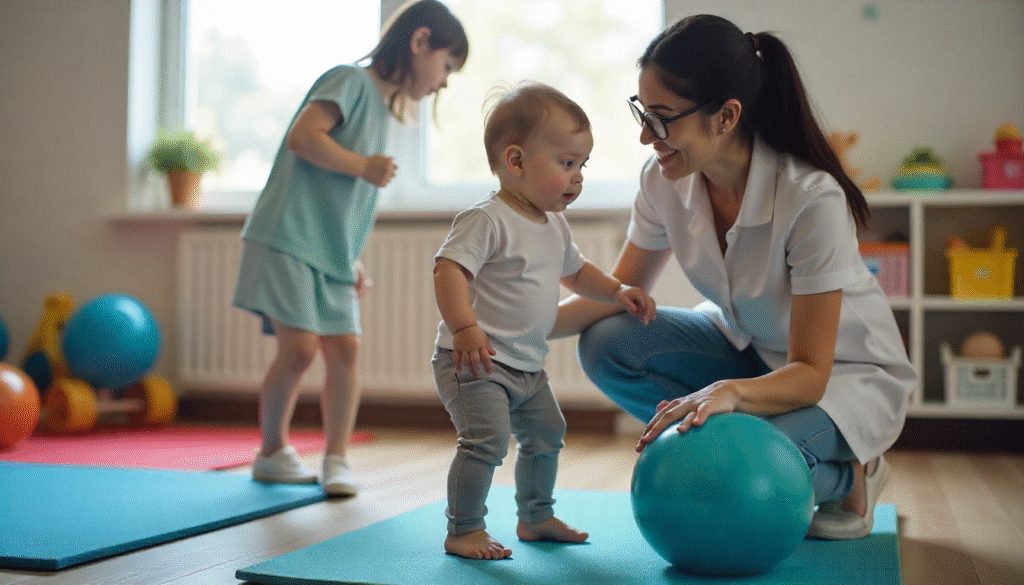Every child develops at their own pace, but certain milestones in movement give us important clues about a child’s overall growth. Gross motor skills are the abilities that involve large muscles of the body and allow children to roll, crawl, sit, walk, jump, climb, and run. These skills are the foundation for independence, play, and participation in everyday life. While some children may naturally be a little slower to achieve these milestones, consistent or significant delays may signal the need for professional help. One of the key professionals who can support children in this area is an Occupational Therapist (OT).
What Are Gross Motor Skills?
Gross motor skills refer to movements that require strength, coordination, and control of large muscle groups in the arms, legs, and torso. They include:
- Holding the head up and sitting without support.
- Crawling, standing, and walking.
- Running, climbing stairs, and jumping.
- Balancing, ball skills, and playground activities.
These skills not only help children move, but also prepare them for fine motor skills like writing, dressing, and using utensils. When gross motor skills are delayed, children may struggle to participate in play, school, or social activities at the same level as their peers.
Signs of Gross Motor Delays at Different Ages
Infancy (0–12 months)
- Trouble lifting the head or rolling over.
- Difficulty sitting without support by 9 months.
- Lack of crawling, scooting, or pulling up to stand by the end of the first year.
Toddlerhood (1–3 years)
- Not walking independently by 18 months.
- Frequent falling, poor balance, or unusual walking patterns.
- Difficulty climbing stairs, running, or kicking a ball.
Preschool years (3–5 years)
- Avoids playground activities like slides, swings, or climbing frames.
- Struggles with hopping, skipping, or pedaling a tricycle.
- Tires quickly compared to peers during active play.
School age (5 years and older)
- Poor coordination in sports, catching, or throwing.
- Difficulty balancing on one foot or learning to ride a bicycle.
- Low confidence in physical games and avoidance of active participation.
It is important to remember that every child develops differently, but a consistent pattern of difficulties should be taken seriously.
Why Seek Help from an Occupational Therapist?
Occupational Therapists are trained to help children build the skills they need to participate in daily activities. For gross motor delays, OTs work on strengthening, coordination, balance, and motor planning. Sessions often look like fun play but are carefully designed to build skills.
Some of the ways OTs support children with gross motor delays include:
- Strengthening exercises for the core, arms, and legs to improve posture and stability.
- Balance and coordination activities such as obstacle courses, jumping games, and climbing.
- Motor planning tasks that help children sequence movements, such as riding a scooter or learning new sports skills.
- Play-based interventions that encourage confidence and participation with peers.
OTs also guide parents with home programs, adapting daily routines, and recommending safe ways to encourage movement during play.
Why Early Intervention Matters
Gross motor skills are building blocks for a child’s independence and confidence. A child who struggles to keep up on the playground may avoid group play, leading to frustration, social isolation, or lower self-esteem. Early intervention not only strengthens motor skills but also helps children engage more fully in school, play, and family life. The earlier concerns are identified, the easier it is to build skills and prevent secondary challenges like poor posture, fatigue, or avoidance of movement.
When to Seek Professional Help
You should consider consulting an Occupational Therapist if you notice:
- Your child is consistently behind peers in motor milestones.
- Movement patterns appear awkward, uncoordinated, or effortful.
- They avoid physical play or tire easily compared to other children.
- Teachers or caregivers raise concerns about participation in group activities.
Trusting your instincts as a parent is also important. If you feel something is “not quite right,” seeking professional advice can provide clarity and reassurance.
Final Thoughts
Gross motor delays do not always mean something serious is wrong, but they can affect a child’s ability to participate fully in daily life. Occupational Therapists play a vital role in identifying challenges early and helping children develop the strength, coordination, and confidence they need. If you notice persistent difficulties in your child’s motor development, seeking support can make a meaningful difference—not just in movement, but in overall growth, independence, and happiness

